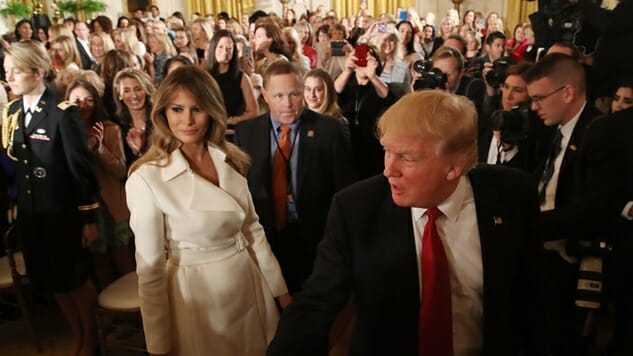America the Self-Censored: Forget Trump’s “Media vs. The People” Narrative, We’re Our Own Worst Enemies
Photo by Mark Wilson/Getty
Scene: Conference Room, Generic American Company
MIDDLE MANAGER: [looking up from spreadsheet] “We really need to expand our market share in Mexico. Any ideas?”
SALESWOMAN: “Hm…I don’t know.” [clicking through the on-screen PowerPoint]. “That might be difficult considering most of them are rapists and murderers. Here, have a look at the data I compiled on Mexico’s population.”
MIDDLE MANAGER: “Pull it up on the monitor so everyone can check it out.” [the multi-color pie chart reads: 43% murderers, 41% rapists, and 16% Miscellaneous; possibly good people]. “This is lunacy Jane. You’re obviously bleeding from your…wherever.”
![]()
Clearly this conference room conversation is total fiction. For one thing, its content—despite obviously (and worrisomely) borrowed almost verbatim from our current President—is highly insulting and utterly insane. But more than making the hypothetical characters a bigot and sexist, respectively, this workplace discussion would make them something else.
Unemployed.
Gone are the days when talking politics at the office is merely frowned upon. Nowadays, expressing many of the views espoused by mainstream politicians (one in particular) would be grounds for dismissal. Talk some serious Trump in a modern workplace and you’ll end up like his losing Apprentice contestants: fired.
As recently as two years ago, colleagues could—and often did—agree to disagree about tax cuts, abortion, and even war. Then, half the country watched in horror as political beliefs expressed by the other half spiraled downward from divisive-yet-decent to completely unacceptable. An electorally significant portion of America now proffers blatant bigotry as political ideology, rather than what they actually are: moral failings.
And fireable ones at that. In professional settings, our rationale for avoiding politics has changed. Previously, we didn’t talk politics out of politeness; now, we refrain out of fear. Before, talking politics was unprofessional; now, the political beliefs themselves are unprofessional.
This subtle yet significant shift in our workday interactions creates a stigma that we inevitably carry into our other public-facing personas. The silence is deafening, and the timing couldn’t be worse.
While a dangerous demagogue discredits the mainstream media and impinges on First Amendment press freedoms, we’ve cranked up the apolitical professionalism to a level 11. We’ve completely censored ourselves.
Media of One
No human instinct is more deeply ingrained than self-preservation. If a scenario is deemed a threat to our needs—especially basics like food, shelter, safety—our brains advise avoidance. In the modern world, most needs are met through commerce. For that, we need money—and for that, the vast majority of us need jobs.
The point: Before saying or doing something arguably controversial, we are encouraged to ask ourselves…
“Could this get me fired?”
Today, this question extends further beyond the physical workplace than ever. Where before it might have taken, say, a felony arrest to get terminated, today that can be accomplished with an ill-advised, 140-character brain fart—instantly available worldwide at the tap of a thumb.
Computer in pocket, today each of us is a media of one. This has given voice to many admirable moral warriors. It has exposed far more bigots and idiots.
But more than anything, it has revealed cowards.
Over the years, we’ve been mainstream media-trained. Commentary-free 30-second broadcast news stories and he said/she said false equivalence reporting have wired us to set our day-to-day default setting at robotically apolitical. Nixon’s notion from 1969 is no less true today: the majority is, indeed, silent.
On the one hand, this reluctance to make waves is understandable. We’ve all seen stories of foolhardy social media shares costing people their jobs; this can and has extended to political posts. Our jobs are our livelihoods. These aren’t just any old boats we’d be rocking—they’re lifeboats.
On the other hand, sometimes bravery must be mustered, and rules of etiquette broken.
Our executive branch is being run by an autocratic-leaning, volatile loudmouth who scapegoats immigrants, his predecessors, and even his own generals. He takes conspiracy theories as gospel, lending presidential weight to wildly unsubstantiated alt-right claims so long as they conform to his increasingly insane narrative.
He’s an unhinged narcissist with nuclear codes. These aren’t normal times, and our norms won’t suffice in addressing them. Our self-preserving excuses for continued timidity have expired.
Those who vehemently oppose Donald Trump’s boldfaced lies and open bigotry must realize this: they are not only on the right side of history but, as far as job security is concerned, the right side of the HR manual.
No one’s going to fire us for openly denouncing—even preemptively—racism, sexism, or homophobia in the office. Hear a colleague recite an “alternative fact?” Politely refute it with an actual one. If it means that person likes you a little less, so be it. We’re at the point where principles must be placed before popularity and, at times, even prosperity.
The same goes for our online lives. A post denouncing bigotry, or refuting a widespread Trump lie, won’t come back to haunt us. Worst case scenario? We shed a few Facebook friends who probably weren’t worth knowing anyway.
The longer we say silent, the longer Trumpism becomes normalized. The time to stop self-censorship is now.